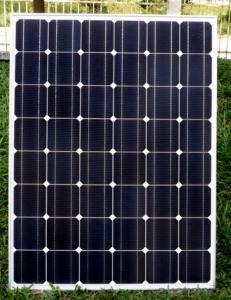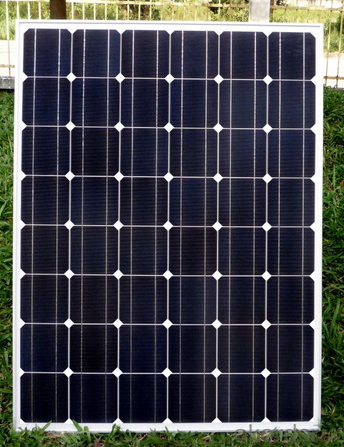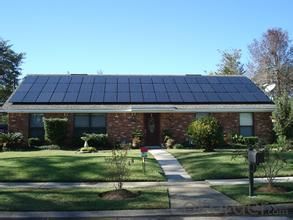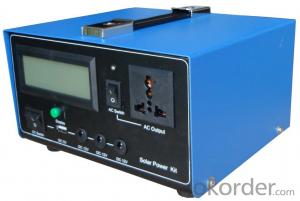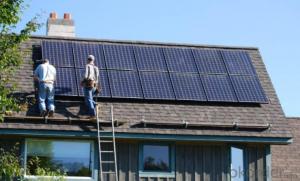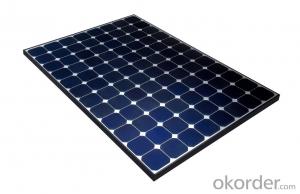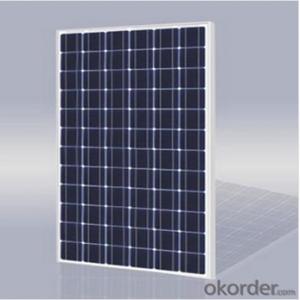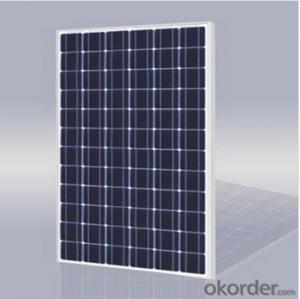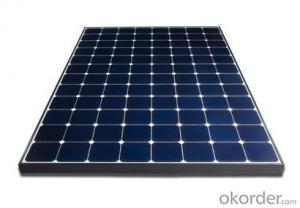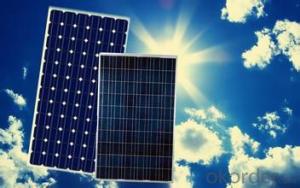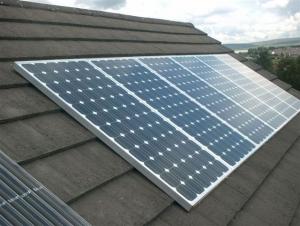Baywa Solar Energy Systems 35.5kw CNBM Monocrystalline Silicon Panel for Home Use
- Loading Port:
- Tianjin
- Payment Terms:
- TT OR LC
- Min Order Qty:
- 50 watt
- Supply Capability:
- 1000 watt/month
OKorder Service Pledge
OKorder Financial Service
You Might Also Like
Specification
35.5KW CNBM Monocrystalline Silicon Panel for Home Using
Production description
Solar energy is radiant light and heat from the Sun harnessed using a range of ever-evolving technologies such assolar heating, photovoltaics, solar thermal energy, solar architecture and artificial photosynthesis.
It is an important source of renewable energy and its technologies are broadly characterized as either passive solar oractive solar depending on the way they capture and distribute solar energy or convert it into solar power. Active solar techniques include the use of photovoltaic systems
The large magnitude of solar energy available makes it a highly appealing source of electricity. The United Nations Development Programme in its 2000 World Energy Assessment found that the annual potential of solar energy was 1,575–49,387 exajoules (EJ). This is several times larger than the total world energy consumption, which was 559.8 EJ in 2012.
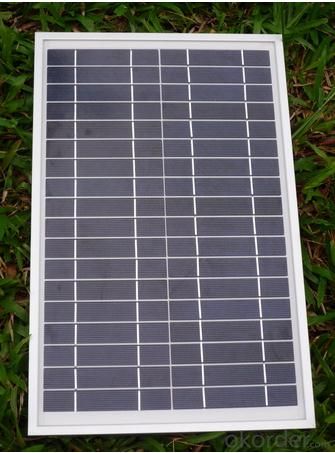
Feature
1.High conversion efficiencies resulting in superior power output performance.
2.Outstanding power output even in low light or high temperature conditions
3.Optimized design for ease of soldering and lamination
Physical characteristic
1. Rigorous quality control meets the highest international standards.
2. High-transmissivity low-iron tempered glass, strong aluminium frame.
3. Using UV-resistant silicon.
4. IS09001/14001/CE/TUV/UL
Packaging
26pcs in one carton 6pallets in 20foot container 14pallets in 40 foot container.
- Q: How do solar energy systems affect the resale value of a home?
- Solar energy systems can have a positive impact on the resale value of a home. Studies have shown that homes with solar panels tend to sell for a higher price and at a faster rate compared to homes without solar energy systems. This is because potential buyers are attracted to the cost savings and environmental benefits associated with solar power. Additionally, solar panels are seen as a valuable asset as they provide a reliable and renewable source of energy.
- Q: Can solar energy systems be used in areas with limited access to solar energy warranties and guarantees?
- Yes, solar energy systems can still be used in areas with limited access to solar energy warranties and guarantees. While warranties and guarantees provide added assurance and protection, the feasibility of using solar energy systems in such areas would depend on the available sunlight and other factors like the system's efficiency, maintenance, and durability. It would be important to assess the specific conditions and potential challenges of the area to determine the viability of installing solar energy systems and explore alternative options to mitigate risks in the absence of comprehensive warranties and guarantees.
- Q: Can solar energy systems be used for powering farms?
- Absolutely, farms can definitely utilize solar energy systems. In fact, farmers around the globe are increasingly embracing solar power as a sustainable and cost-effective alternative to conventional energy sources. By installing solar panels on barns and other farm structures, or even on ground-mounted systems, electricity can be generated from the sun's energy. This clean and renewable power can then be employed to fuel a range of farming activities, including irrigation, lighting, ventilation, and machinery. By reducing reliance on fossil fuels, solar energy systems can substantially lower farmers' expenses on electricity bills over time. Moreover, the integration of energy storage solutions, such as batteries, with solar power systems ensures a continuous supply of electricity even during periods of limited sunlight. By harnessing the sun's power, farmers can not only minimize their environmental impact but also enhance the sustainability and efficiency of their operations.
- Q: How does the size of a solar energy system affect its output?
- The size of a solar energy system directly affects its output. A larger system will generally produce more energy compared to a smaller one, as it has a greater capacity to capture and convert sunlight into electricity. The number and efficiency of solar panels in the system, along with other components such as inverters and batteries, determine the overall output.
- Q: Can a solar energy system be installed on a concrete roof?
- Yes, a solar energy system can be installed on a concrete roof. In fact, concrete roofs are one of the most ideal surfaces for solar panel installation. Concrete roofs are typically flat, stable, and durable, providing a solid foundation for the panels. Additionally, concrete roofs often have ample space and are not obstructed by nearby trees or buildings, allowing for maximum sunlight exposure. The installation process involves securing the panels to the concrete roof using special mounting systems designed to withstand the weight and ensure a secure attachment. Overall, concrete roofs are a great choice for solar energy system installation.
- Q: Can solar energy systems be used in powering printing presses or publishing houses?
- Printing presses and publishing houses can be powered using solar energy systems. Solar panels can harness the renewable and sustainable power of the sun and convert it into electricity. This electricity can then be used to operate various equipment found in publishing houses, including printing presses, computers, and machinery. By installing solar panels on the rooftops of these facilities, a significant amount of electricity can be generated. This reduces the need for traditional energy sources and lowers utility costs. The size of the solar energy system required will depend on the specific energy demand of the facility, but it is entirely feasible to power printing presses and publishing houses with solar energy. Solar energy systems also provide a reliable and consistent source of power, as long as there is sufficient sunlight available. This is especially advantageous in regions with abundant sunlight, as the facilities can potentially become self-sufficient in terms of electricity generation. Furthermore, utilizing solar energy systems for powering printing presses and publishing houses has environmental benefits. Solar power is a clean energy source that produces no greenhouse gas emissions or air pollution during operation. By switching to solar energy, these facilities can significantly reduce their carbon footprint and contribute to a more sustainable future. In conclusion, solar energy systems offer a renewable, sustainable, and environmentally friendly alternative for powering printing presses and publishing houses. They provide the potential for cost savings, energy independence, and a reduced carbon footprint.
- Q: Can solar energy systems be used for powering off-grid eco-retirement communities?
- Yes, solar energy systems can definitely be used for powering off-grid eco-retirement communities. Solar power is a reliable and sustainable source of energy that can provide electricity for various needs, such as lighting, heating, cooling, and powering appliances. By installing solar panels and utilizing energy storage systems, off-grid eco-retirement communities can reduce their reliance on traditional power grids and minimize their carbon footprint. This not only helps in achieving energy independence but also promotes a greener and more sustainable lifestyle for the residents.
- Q: Are there any risks of electrical shocks during installation or maintenance of solar energy systems?
- During the installation or maintenance of solar energy systems, one must be aware of the risks of electrical shocks. These systems involve working with electrical components, such as solar panels, inverters, and batteries, which carry high voltage. Failure to follow proper safety measures can result in contact with live electrical parts and the possibility of receiving an electrical shock. Several factors can contribute to the risk of electrical shocks, including improper installation, insufficient knowledge or training in electrical systems, failure to use personal protective equipment (PPE), and inadequate grounding. It is crucial to adhere to safety guidelines and regulations when installing or maintaining solar energy systems. This includes wearing insulated gloves, using insulated tools, and ensuring proper grounding. Furthermore, working at heights during installation or maintenance introduces an additional hazard of electrical shocks. Care must be taken to prevent falls or accidental contact with live electrical parts while working on rooftops or elevated areas. To minimize the risks of electrical shocks, it is advisable to hire qualified and trained professionals for the installation and maintenance of solar energy systems. Regular inspections and maintenance checks should also be conducted to identify and address any potential electrical hazards. In conclusion, while solar energy systems offer many benefits, it is vital to be aware of the potential risks of electrical shocks and take the necessary precautions to ensure the safety of individuals involved in the installation or maintenance process.
- Q: I usually have to use about 10 degrees, more in the summer! Winter sunshine time 10 hours! Who knows how much a set price, what brand?
- General installation 3000W on the line, a full set of system down 21 thousand yuan. Print-Rite used solar panels, inverter with crystal fuyuan. Guilin Jinyang PV is so safe.
- Q: Can solar energy systems be used in rural areas without access to the grid?
- Yes, solar energy systems can definitely be used in rural areas without access to the grid. In fact, solar power can be an ideal solution for off-grid locations as it harnesses energy from the sun and converts it into electricity without the need for traditional power sources. Solar panels can be installed on rooftops or in open areas to capture sunlight, which is then converted into usable electricity through an inverter system. This energy can be used to power various appliances and devices, providing electricity for lighting, charging mobile phones, running small appliances, and even powering agricultural equipment or water pumps. Additionally, excess energy generated during the day can be stored in batteries for use during nighttime or cloudy days. Solar energy systems offer a sustainable and reliable source of electricity for rural communities, reducing their dependence on expensive and unreliable fossil fuel-based generators or traditional power grids.
Send your message to us
Baywa Solar Energy Systems 35.5kw CNBM Monocrystalline Silicon Panel for Home Use
- Loading Port:
- Tianjin
- Payment Terms:
- TT OR LC
- Min Order Qty:
- 50 watt
- Supply Capability:
- 1000 watt/month
OKorder Service Pledge
OKorder Financial Service
Similar products
Hot products
Hot Searches
Related keywords
